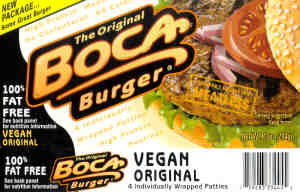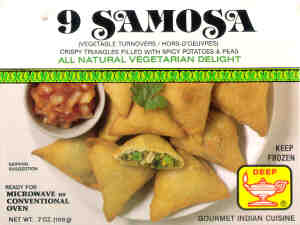 BEER! BEER! BEER! BEER!
BEER! BEER! BEER! BEER!
Coordinators Joe Holtz and Mike Eakin sadly began the meeting with bad news: our gross margin -- the total income from sales, excluding costs -- is "troublingly" low, "a real concern." Shrinkage -- loss of income mostly from theft or damage of inventory; get that Seinfeld episode out of your head -- is at its highest in several years.
Theft by our own utopian members has always been high, so the coordinators announced an education campaign to remind us that stealing is bad and how to catch others doing it. Holtz and Eakin showed off empty boxes once containing stuff like a $17 steel Thermos and $19 light bulbs. Ironically, both are high-ticket nonfood items favored by the coordinators but opposed by members who want to see scarce shelf space used for more earthy-crunchy goods.
Eakin added that it was time to better enforce rules against eating as you shop (a survival skill when the "express" line can take 20 minutes), and that he himself had not acted when he saw members snacking as they bagged food in the basement. Actually, that sounds like more of a health-code violation than a shrinkage problem. Saliva-sticky fingers should not be poking around the cheese, nuts, and dried fruit the coop helpfully buys in cheap bulk and sells in little affordable bags at low cost.
Another coordinator updated us on the front-end rebuild, which will soon include scanning not only of groceries but of new ID cards. A member asked whether data would be collected on individuals. The coordinator said that that was inevitable, but that the intention was to use it to measure group buying patterns.
The Environmental Committee reported that is hard to tell what food is free of genetic engineering (GE), what with 40 to 50 percent of soybeans and 20 to 30 percent of corn now being bioengineered. European Community wariness of GE food has pressured some silo owners to declare that they will reject such crops, but testing difficulties mean that they can't be sure of their own inventory.
The Environmental Committee had asked some manufacturers whether they used GE ingredients. Some had replied no. But how could they know? asked the committee representative. He said the Flavr Savr tomato's unlabeled existence was proof that Heinz couldn't guarantee that its ketchup was GE-free. Not quite true: Monsanto discontinued the Flavr Savr because it was a premium-priced, boring processing tomato that was just slower to rot. It was too expensive for industry and too dull to eat fresh. After another year or two of development, the Flavr Savr traits will be found in premium tomatoes, which don't get turned into ketchup. Frankenketchup is in our future, but it is still some years away.
The Building Next Door's Renovation Committee representative delivered her update. Last month, starting a flurry of e-mail, Doyle Warren, board member and coop president and member of the defrocked Project Development Team, had complained of being cut off from the construction manager's updates, and of being refused access to a Renovation Committee meeting. The committee replied that it had first decided to close most of its meetings, then to close only sensitive meetings. This was a backstep from a past pledge to keep its meetings open to everyone. The committee also said that Warren had been cut off from the contractor to remind the latter that the committee was now in charge, not to deprive Warren of information, and that Warren would be copied in through Joe Holtz. That is roughly akin to the Simpsons' Scratchy depending on Itchy for advisement.
 But all that was in e-mail. At the General Meeting, the Renovation Committee rep simply announced that some meetings would be closed for sensitive contract and bid discussions. Visibly pissed, the chair, backed by audience support, reminded the rep that the General Meeting had to ratify that change. The chair then asked what architectural changes had been made to the Building Next Door plans. "I can tell you, if you like," said the rep. Well, yes, we like. She said the atrium is history. Wanted by members but fiercely opposed by coordinators, the skylit atrium had been redesigned into a shrunken, stark airshaft that still wasted upstairs space around it, and added to the renovation cost. There will be other skylights, she assured us. She argued briefly with a knowledgeable member who said it still would have lit a greater area than she claimed.
But all that was in e-mail. At the General Meeting, the Renovation Committee rep simply announced that some meetings would be closed for sensitive contract and bid discussions. Visibly pissed, the chair, backed by audience support, reminded the rep that the General Meeting had to ratify that change. The chair then asked what architectural changes had been made to the Building Next Door plans. "I can tell you, if you like," said the rep. Well, yes, we like. She said the atrium is history. Wanted by members but fiercely opposed by coordinators, the skylit atrium had been redesigned into a shrunken, stark airshaft that still wasted upstairs space around it, and added to the renovation cost. There will be other skylights, she assured us. She argued briefly with a knowledgeable member who said it still would have lit a greater area than she claimed.
Whether to add a barter column to the coop newspaper was the first agenda item -- actually, it was the second, but the proposer's squalling brat encouraged the Agenda Committee to rush her item forward. In a barter column, members could request services or goods and propose equivalents for exchange, like trading house-painting for a summer share. Alternative local currencies like Brooklyn Greenbacks and Ithaca Hours could also be exchanged.
Discussion centered on how participants could handle taxes for the value of what was bartered, how to "protect us from psychos or frauds," and how to protect the coop from liability -- queries that ticked off the proposer. There's a "double standard; paid ads aren't required" to do that, she complained. "How does life protect us from psychos or frauds?" The coop being a small, closed community, she said, would help. Eventually the proposer accepted the disclaimer, but she refused to let the newspaper charge for barter ads, as it does with other classifieds: No, that's advertising, "money commerce," she said vehemently; bartering was meant to work around that.
Everyone spoke against allowing members to barter their workslot obligations, which usually are 2.5 hours of labor every four weeks. But few wanted explicitly to forbid trading workslots for barter or cash, as some now do on the sly. "We were very disturbed to learn of that," said a coordinator. "But there's no policy against it, and it tends to be high schoolers earning baby-sitting-level money. They grow out of it." Added another coordinator, "We know it goes on. That doesn't mean we encourage it."
Since an amendment to exclude workslots grew more popular the more it was discussed, the proposer agreed to it. Discussion grew animated. "Let's vote on the amendment, then the proposal," said board member Eric Schneider. "But it's a friendly amendment, she accepted it," protested the chair. The proposer, nervous about accepting an amendment that might be disliked, then rejected it, forcing us to vote on it as an unfriendly amendment. The chair asked Schneider to phrase the amendment. He did so, but added incoherent rambling about not "subsidizing slackers." Huh? The chair asked anyone to phrase the amendment "without extra words." Abashed, Schneider got it right this time. The amendment passed 19-10 with 5 abstentions, and the whole proposal passed 32-0 with 2 abstentions.
Like a bottle of bad homebrew, the second agenda item -- to end an old ban against selling beer -- began smoothly but ended in murk. The proposer, barely old enough to drink, emphasized that beer sales would have to wait for the finished Building Next Door's greater space, and that only "quality" organic, free-range beers would be stocked. "It follows that you're not going to see Coors. . . . Four or five different beers will be more than enough," he said.
 "Just lots of them!" yelled someone.
"Just lots of them!" yelled someone.
"This has something for everyone!" said the proposer perkily: it'll bring in new members and help defray expansion costs. How can it defray costs if it must wait for the Building Next Door's completion, challenged an audience member. By helping to pay off the mortgage, said the proposer, clearly relishing the forensics.
"I know this is a fun topic, but we're going to take lists" of speakers, chided the chair. "If we sell ice cream, we should sell beer," said one member. "Beer is good for breast milk!" said another. "Guinness is called 'black milk.'" "Can we have Czech beer?" Young people would be carded to keep from buying beer, it was decided; if necessary, age flags could be added to the coop's growingly Orwellian database.
What was the coop's liability if one of our hundreds of infrequently trained checkout workers was caught selling beer to an underage narc, I asked. No one answered. Would we be stuck accepting outsiders' returnable empties? I added. Schneider said that as a private organization, we didn't have to let outsiders in. Let's bring all our bottles to Key Food, joked another board member.
"If we sell hydrogenated fats, refined sugars, and other toxic products, I have no objection to this," said board member Electromagnetic Israel. But he'd heard objections from those outside this small General Meeting. Such a big decision should be made by referendum, he said. Another member worried about offending Muslims. But another member said that Muslim-owned stores sell beer, and that we're already offending our Hasidic members with our shrimp, and vegetarian members with our poultry and dairy.
The wording was changed so it would allow us to consider carrying beer, and not force us to do so. Few wanted a referendum, as its complexity and delay could sink any proposal. And Eakin said that a multi-question referendum, an expensive process, could be used to discuss many items a year from now; he favored calling the question (forcing the vote).
The question was called and the proposal carried overwhelmingly, 24-9 with 5 abstentions. The board of directors met to confirm the General Meeting's votes, and voted 6-0 to confirm the barter vote and 5-0 to confirm the beer vote, with Doyle Warren abstaining.
![]() Next dispatch.
Next dispatch.
![]() Previous dispatch.
Previous dispatch.
![]() Back to list of dispatches.
Back to list of dispatches.